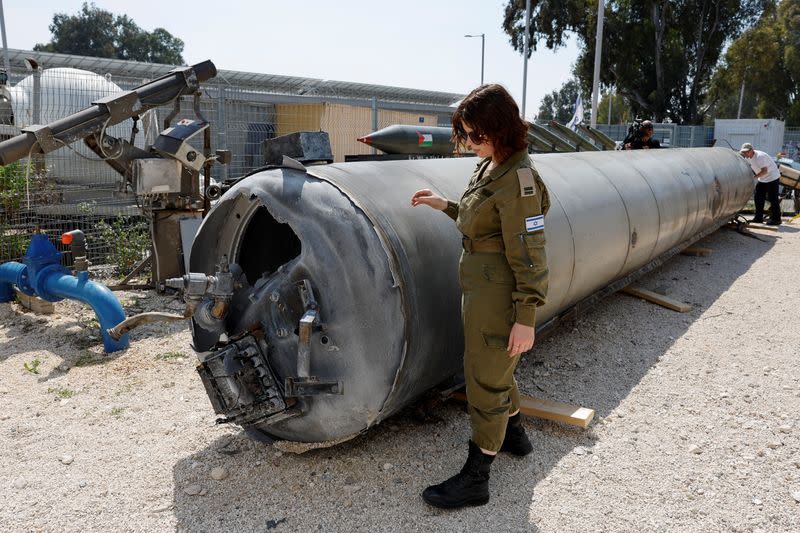US and Britain announce new Iran sanctions after missile and drone strike on Israel

- Oops!Something went wrong.Please try again later.
By David Brunnstrom and Doina Chiacu
WASHINGTON (Reuters) - The United States on Thursday announced new sanctions on Iran targeting its unmanned aerial vehicle production after its attack on Israel, and U.S. President Joe Biden said G7 leaders were committed to acting together to increase economic pressure on Tehran.
Britain announced that it was also introducing sanctions on Iran in co-ordination with Washington.
Biden said the United States and its allies had helped Israel beat back the April 13 missile and drone strike and were now holding Iran accountable with the new sanctions and export controls.
"The sanctions target leaders and entities connected to the Islamic Revolutionary Guard Corps, Iran's Defense Ministry, and the Iranian government's missile and drone program that enabled this brazen assault," Biden said in a statement.
British Foreign Secretary David Cameron called Iran's behavior "unacceptable."
"(It) is a message to Israel that we want to play our part in having a coordinated strategy that deals with Iran's aggression," Cameron said on the sidelines of a meeting of foreign ministers from the Group of Seven (G7) major Western powers in Italy.
The U.S. Treasury Department said the U.S. measures targeted 16 individuals and two entities enabling Iran's UAV production, including engine types that power Iran's Shahed variant UAVs, which were used in the April 13 attack.
Tehran says it carried out the attack in retaliation for a presumed Israeli strike on the Iranian consulate in Damascus which killed two generals and several others on April 1.
Israel has said it will retaliate against Iran's unprecedented launch of missiles and drones, while a senior Iranian Revolutionary Guards commander said on Thursday Iran could review its "nuclear doctrine" following Israeli threats.
SANCTION TARGETS
Treasury said it was also designating five companies in multiple jurisdictions providing component materials for steel production to Iran’s Khuzestan Steel Company (KSC), one of Iran’s largest steel producers, or purchasing KSC’s finished steel products.
Also targeted were three subsidiaries of Iranian automaker Bahman Group, which it said had materially supported Iran's Islamic Revolutionary Guard Corps.
In a separate announcement, the U.S. Commerce Department said it was further restricting Iran's access to "low-level technology", adding to the list of items that require a license for export or re-export to Iran, including items made abroad with U.S. technology.
Britain said it was sanctioning seven individuals and six entities, including the Armed Forces General Staff and the Islamic Revolutionary Guard Corps Navy.
The West has imposed repeated sanctions on Iran over the years, with Britain saying that it alone had introduced more than 400 different economic restrictions on Israel's arch foe.
European Union leaders also decided on Wednesday to step up sanctions against Iran after Tehran's attack on Israel raised concerns about a wider conflict in the Middle East.
(Reporting by David Brunnstrom and Doina Chiacu in Washington and Crispian Balmer in Capri; Editing by Chizu Nomiyama, Angus MacSwan, Alistair Bell, Alexandra Hudson)

